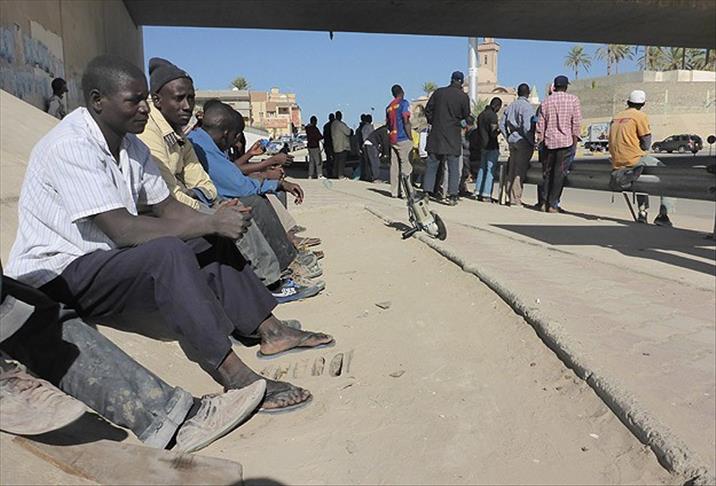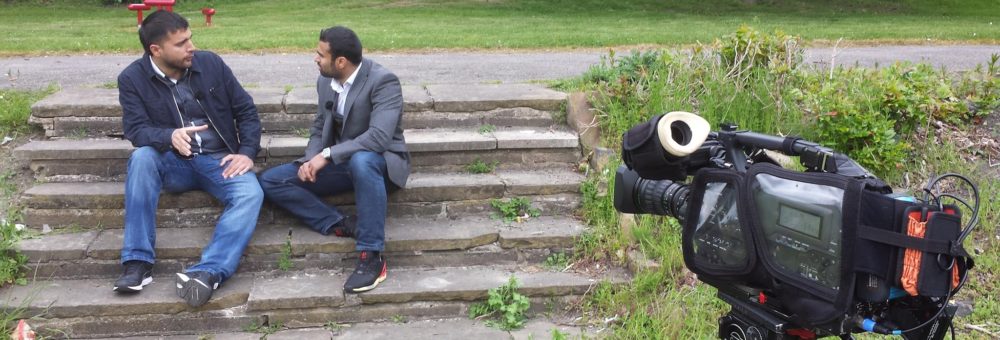AA commissions investigation into how Libyan smugglers transport undocumented migrants from the restive N.African state into Europe, via Italy.

LONDON
Anadolu Agency recently commissioned an investigation into how Libyan smugglers transport undocumented migrants from the restive North African state into Europe, via Italy. Our correspondent Assed Baig posed as a migrant trying to reach the Italian island of Lampedusa in order to gain an insight into the smuggling network.
There are several places where boats leave from: Tripoli, Zawara and Misrata are the most popular departure points. We chose to concentrate on trying to get a boat from Tripoli.
“Don’t worry, you will definitely get to Lampedusa, there is a boat leaving soon. It’s a sure thing,” said the voice on the other end of the telephone. He went on tell me that there was a cargo ship due to sail shortly, and that I could buy my passage onto it, but I had to be quick as places were filling-up rapidly.
As I would learn later, this offer and the conditions of passage would change several times. The smugglers use these tactics to ascertain their potential customer’s level of interest and sheer desperation, before reeling them in to embark on the treacherous journey across the Mediterranean Sea to the Italian island.
Smuggling is big money. Charging up to $2,000 per person, and filling up a boat to 200 people can mean that smugglers can get rich fast, with little or no concern for the people that they are sending out to sea, many of whom will meet their death before they ever see Europe. The Libyan smugglers shrewdly employ people from other nationalities in order to entice potential customers from destitute immigrant communities. These individuals can be Somali, Chadian or Pakistani. My smuggler’s name was Kashif. He was from Pakistan and had been in Libya for a few years; operating his lucrative smuggling business from there. He had no need to resort to making a dangerous trip to Italy unlike the migrants.
You never get to meet the smugglers until the time of departure. Once you are picked up by the smugglers and taken to a ‘safe house’ there is no turning back. You have to stay in the safe house until the boat is ready to leave.
In Tripoli I met Atif, a Kashmiri who had attempted the journey to Lampedusa but failed. He was kept in a safe house for five days. I spoke to others that had stayed longer, up to fifteen days in one case.
“The smugglers check the internet for weather reports before they set off,” Atif told me.
Whilst talking with Atif, I found out that his village in Kashmir is only an hour and a half’s drive from where my family comes from. It was a sad discovery- and one that prompted hard reflection. My grandfather had moved to the UK, where I was born, and Atif had been born in Kashmir, where the economic hardships had forced him to leave and try and gain passage to Europe. What if I had been born in Kashmir- would I too be in Libya risking my life to get to Europe so I could support my family back home?
Those that captain the boats often have very little experience at sea. Sometimes the migrants are given a discount on the price for passage for steering the boat themselves. Once on the ship the smugglers point the escapees in the direction of Lampedusa and they set sail, using substandard vessels, many with motors that run out of fuel mid-ocean.
The boats that take the Somalis to Lampedusa are cheaper to pay for, but much more dangerous. The Syrian boats are more expensive but are bigger and ‘safer’ according to Atif. The Syrians have more money, at least more than those from Somalia, Mali, and Niger.
“They told me it would be a big boat, but once I saw the boat I was shocked. It was so small,” Atif told me whilst sitting in the hotel he now works in. There are many migrants working in hotels across Tripoli. They sometimes work there to save up money to be able to afford the journey to Lampedusa.
“We got lost, and the boat began to take in water. For three hours we wandered the sea, not knowing where we were headed,” recalls Atif.
“The Libyan coast guard then found us and we were all taken to prison,” he claims.
“They didn’t beat me but they beat the blacks badly. It was horrible. The women were asked for sex in return for their release,” he told me, with a troubled look on his face as he recalled what he had witnessed.
A few days later Kashif, the smuggler, contacted me again. I told him I still wanted to go but was uncertain about going into a safe house. He reassured me, “You don’t have to go to the safe house if you don’t want, we’ll just let you know when the boat is leaving and you can get on it then,” he said. It seemed too good to be true. Kashif also repeated that it would be a cargo ship and that I would be sharing it with other people from different nationalities, mainly Syrians.
The details changed by the time we had our next conversation.
“It’s a big fishing boat, we’ve had to change some things because of the troubles in Tripoli,” he told me. Over forty people had been killed the previous day as a militia opened fire on demonstrators. Kashif had conveniently changed the mode of transport from a cargo ship to a fishing boat. I was not very confident that it would be a large fishing boat.
Two days later Kashif called again. He said “do you still want to go?” in a direct and firm manner. I told him I did.
“Look, I don’t want to lie to you, you seem like a nice guy. The boat is leaving in the next few days, we will pick you up, and will take you to the safe house. You won’t be able to leave until the boat is ready to go,” he told me with an air of urgency.
“Once you are in the car there is no turning back. Even if you don’t like the boat, you’re getting on it, these Libyans will beat you senseless and throw you on that boat, but you will not be able to turn back,” he said sternly. He had changed all the conditions. I told him I still wanted to go but needed a day to think about it. He told me to think quickly as the boat was leaving soon.
Feeling anxious, I put down the phone. I could not take anything with me on the ship- no bag, only our money; mobile phones would be taken off us and only handed back when we boarded. There were now an over-abundance of risks to consider – first off, there was no telling how long I would be at the safe house; then there was the hazard of drowning out at sea; and most troubling of all, there was the danger of being discovered as a journalist. The smugglers do not want to risk giving up their location of departure or safe house out of fear of getting caught. Also, once someone has seen the smugglers faces, they do not want you turning back, they are very cautious not to get caught.
I had been interviewing people all week- perhaps someone had noticed me. If one of the smugglers or fellow migrants became suspicious of me and concluded that I was either a spy or journalist, I would probably end up dead.
What’s more, I thought, if I drowned or was murdered at sea, it would be very likely that no-one would ever find out how or where I died. Thoughts of my son without a father drifted through my mind.
“The one sending them does not care about whether they make it or not. He just wants his money. He wants to see them off the shore and out of sight. He knows the chances of the migrants making it to Lampedusa are minimal,” said 35-year-old Ashraf, who has been a fisherman for over 15 years. He told me smuggling has increased since the fall of Gaddafi. The country’s instability has benefited criminal gangs who are capitalising on people’s desperation.
Ashraf added that he has seen boats with migrants out at sea. “The boats are always over loaded, a boat that is meant to carry 50 people, the smugglers put on 200, maybe more.”
“It’s suicide to go on those boats, most of the people never make it,” he observed.
The boat was due to leave the next day; I had to weigh up the risks, and decide whether to go or not. It was impossible to resist the conclusion that the danger was simply too great.
Having edged toward a final decision, I was prompted to bitter reflection: if I was an undocumented migrant fleeing the war in Syria, or endemic poverty in Somalia or Eritrea than I would not have the option of stepping back from such risks- because anything would be better than what I had left behind. Risking my life would have seemed a viable option, even if it meant surrendering my fate to the smugglers and the sea.
That day I went out and looked out at the shores of the Mediterranean. The waves were smashing across the rocks relentlessly. How could a boat even leave under these conditions? Yet as bad as they were, I knew from my experiences so far that many poor and desperate people would attempt the crossing, perhaps in even worse weather, and that some unscrupulous trafficker would make money out of it.
In the end the decision was made for me.
Anadolu Agency thought the risk and danger were far too high for me to go with the smugglers. There would be no way of knowing where I was, where I was being kept, when I was leaving and if I would make it. Taking all these factors into account, the agency pulled me out due to safety concerns. We do not know what happened to the boat that was scheduled to leave Tripoli. We are not sure if they made it.
“I’ve seen them floating out in the water, I’ve brought up bodies in my fishing nets,” Cruz, a fisherman in Tripoli, told me as I stared out at the sea, knowing that I would remain on solid ground for the rest of my time in Libya.
“I have seen bodies out at sea, men, women, and children,” he added, before leaving me with my thoughts.
Read the original article published in Anadolu Agency on 7 December 2013
